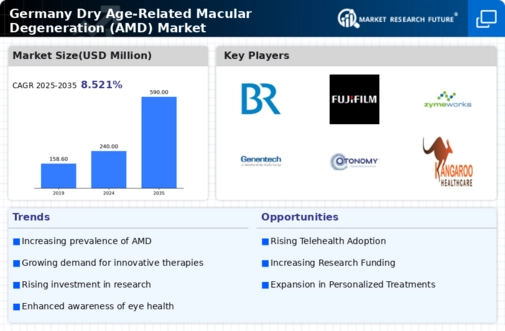Increasing Aging Population
The Global Germany Dry Age-Related Macular Degeneration (AMD) Market Industry is significantly influenced by the rising aging population. As individuals age, the prevalence of AMD increases, with studies indicating that nearly 10% of people aged 65 and older are affected by this condition. In Germany, the demographic shift towards an older population is evident, with projections suggesting that by 2035, approximately 30% of the population will be over 65. This demographic trend is likely to drive demand for AMD treatments and management solutions, contributing to the market's growth, which is expected to reach 12.5 USD Billion in 2024.
Government Support and Funding
Government support and funding play a crucial role in shaping the Global Germany Dry Age-Related Macular Degeneration (AMD) Market Industry. Various health policies and funding initiatives are being introduced to promote research and development in AMD treatments. For instance, the German government has allocated resources to support clinical trials and innovative therapies aimed at addressing AMD. This financial backing not only fosters innovation but also encourages collaboration between public and private sectors. As a result, the market is expected to benefit from enhanced research capabilities and improved treatment options, ultimately leading to increased market growth.
Advancements in Treatment Options
Innovations in treatment options for dry AMD are propelling the Global Germany Dry Age-Related Macular Degeneration (AMD) Market Industry forward. Recent developments in pharmacological therapies and nutritional supplements have shown promise in slowing disease progression. For instance, the introduction of new formulations that enhance retinal health may improve patient outcomes. As these advancements become more widely available, they are expected to attract a larger patient base. The market is projected to grow at a compound annual growth rate of 6.5% from 2025 to 2035, potentially reaching 25 USD Billion by 2035, reflecting the increasing investment in research and development.
Technological Integration in Healthcare
The integration of technology in healthcare is transforming the Global Germany Dry Age-Related Macular Degeneration (AMD) Market Industry. Telemedicine and digital health platforms are facilitating remote consultations and monitoring for AMD patients, improving access to care. These technologies enable healthcare providers to offer personalized treatment plans and follow-up care, which may enhance patient adherence to treatment regimens. As technology continues to evolve, it is anticipated that more patients will seek out these innovative solutions, contributing to market expansion. The convenience and efficiency of these services are likely to attract a broader demographic, thereby increasing market size.
Rising Awareness and Screening Initiatives
The Global Germany Dry Age-Related Macular Degeneration (AMD) Market Industry is benefitting from heightened awareness and screening initiatives aimed at early detection of AMD. Public health campaigns and educational programs are being implemented to inform the population about the risks and symptoms of AMD. For example, initiatives by health organizations encourage regular eye examinations, which can lead to earlier diagnosis and treatment. This proactive approach is likely to increase the number of diagnosed cases, thereby expanding the market. As awareness grows, the demand for AMD-related healthcare services and products is expected to rise, further driving market growth.






















